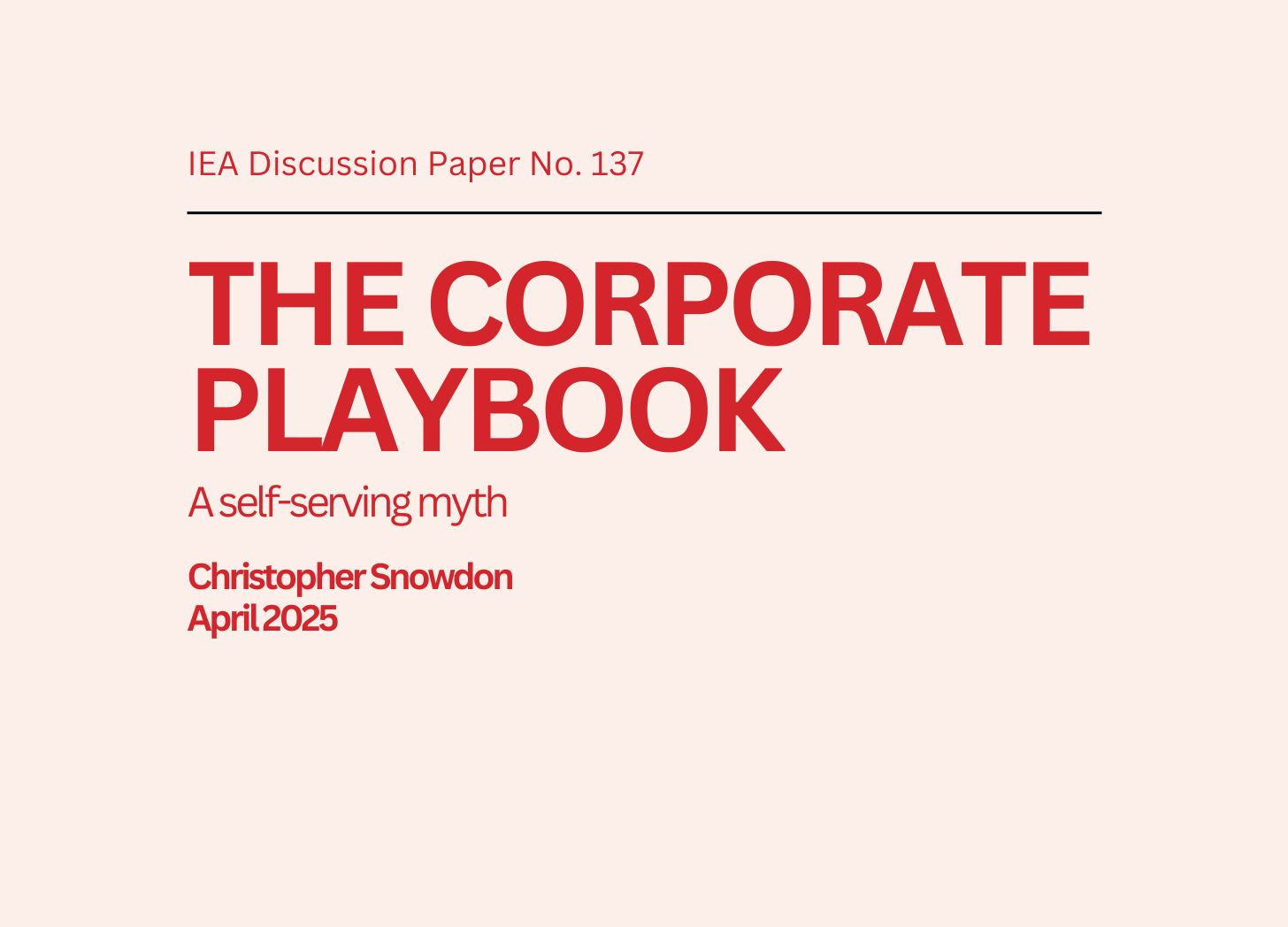By Christopher Snowdon
Public health academics claim industry tactics are uniquely harmful but provide no control groups or comparisons to non-industry actors.
The same political strategies are routinely used by public health campaigners themselves.
The 'corporate playbook' is a rhetorical device, not a meaningful contribution to political science.
A new paper from the Institute of Economic Affairs challenges the idea that “unhealthy commodity industries” like tobacco, alcohol, food and gambling follow a uniquely manipulative ‘corporate playbook’. The discussion paper, The Corporate Playbook: A Self-Serving Myth, argues that the tactics these industries are accused of using, including lobbying, coalition-building, media engagement and legal threats, are standard across all sectors, including NGOs and public health groups themselves.
Dr Christopher Snowdon, report author and Head of Lifestyle Economics at the Institute of Economic Affairs, says that the so-called ‘corporate playbook’ is not distinct to controversial industries, but reflects standard public affairs strategies.
Drawing on over a decade of public health literature, the paper critiques its most common framework — the Corporate Political Activity (CPA) taxonomy — and finds that it fails to demonstrate how these strategies differ at all from those used by non-industry actors.
According to the landmark study by Savell et al. (2014), the tobacco industry used six policy-influencing tactics between 1990 and 2013:
Information (direct and indirect lobbying; commissioning research; collaborating with government)
Constituency building (forming alliances with other sectors; media advocacy; creating front groups)
Policy substitution (developing alternatives to regulation, e.g. voluntary codes of conduct)
Legal (using or threatening legal action)
Constituency fragmentation (neutralising or discrediting opponents)
Financial incentives (gifts, inducements and promising future employment to policymakers)
The report includes examples of how public health campaigners routinely use the same six strategies ascribed to industry. These include lobbying policymakers, building coalitions, working with the media, collaborating with government departments, and discrediting opponents.
For example, the 2007 indoor smoking ban, campaigned for by the pressure group Action on Smoking and Health, used five of the six strategies listed in the “tobacco playbook” framework.
As argued by Dr Snowdon, “There is nothing special or unique about the political strategies attributed to the tobacco industry, let alone the other ‘unhealthy commodity industries’.”
The paper points to a double standard in the way political activity is described: “In this literature, it is common to see industry lobbyists described as ‘corporate actors’ or simply ‘lobbyists’ while public health lobbyists are ‘advocates’, ‘professionals’ or ‘experts’.”
Snowdon concludes that the ‘corporate playbook’ framing is not a serious analytical tool, but a rhetorical device designed to exclude certain stakeholders from the policy-making process. It is best understood as an activist tactic, not a serious attempt to advance our understanding of political science.
Dr Christopher Snowdon, Head of Lifestyle Economics at the free market think tank the Institute of Economic Affairs, said:
“Every industry from infant formula to mobile phones has been accused of using the so-called ‘tobacco playbook’ over the years. It is a fatuous insult that has lost all meaning. Academics who have tried to put some beat on the bones of this jibe have only succeeded in providing a definition of normal political activity. Phrases like ‘corporate playbook’ and ‘commercial determinants of health’ should be seen as a red flag for dogmatic activism.”
If you are interested in reading more like this, the conclusion of Chris Snowdon’s series ‘Killjoys’ is now available to paid Insider subscribers






A good and detailed piece. All minority groups, suppliers and users, fight for their own corner. As in all battles, tactics are used and one will be ‘fight fire with fire’. But we live in, or at least want to live in a fair and democratic society with free speech and a free life with quiet occupation. It is like walking a tight rope to govern whilst trying to make everyone happy! But you are right! It’s gorilla warfare for both sides! And that is or can be more corrosive than, whatever they are fighting over. For example the influence allowed by a close ear via lobbying can be very corrosive to have so much influence. And also gratuitous brown paper bags full of cash can be worse! Society allows the minority tail wag the dog more than we should. In a democracy where the 51% beats the 49% minority’s should realise if the minority stays a minority or if it becomes the majority then it can win by opinion of the many, not the few! (Politicians). We do not use our democratic state as we should. Instead of leaving the decisions to the few, where we clearly have popular opinion on our side, we should demand change because it’s the majority, just like Brexit!… for example if the majority want to ban smoking… ban it! Or if the majority want to ban social media for all under 18s ban it! Mind you Brexit is not a good example in reality as the amount of voters who voted to leave EU was less than 50% of the total possible electorate! As not all voters actually voted! So was it as democratic as it should it could have been, I’m not sure it was fair. It wasn’t convincing enough to leave on the result of less than 50% of the vote! We are in a world where we can vote by phone! Do we really need to still accept the will of one leader and their views rather than a full vote of people? We should be thinking modern and not accept archaic voting and governing systems. A bit like our monetary system! It’s archaic and doesn’t work! We need a better working system based on ALL money moving via ALL money being spent to avoid money being held by the rich making the majority devoid of it! Use computer banking and money electronic! Why do we need cash? Just like loopholes why do we put up with them? But that’s another question.